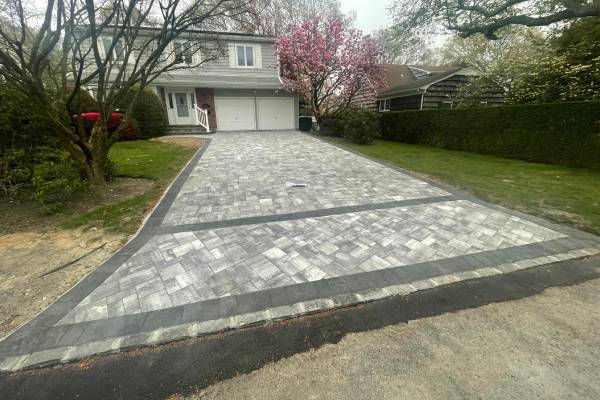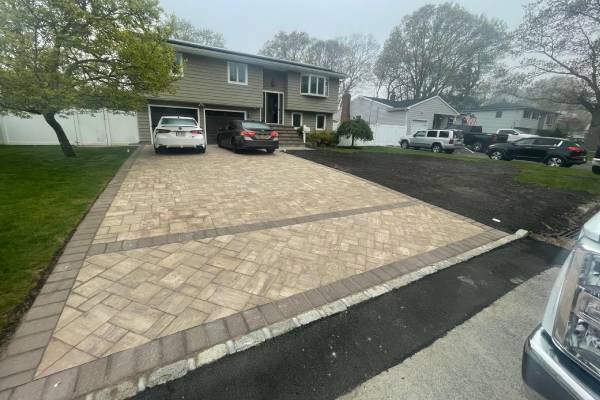Paving services can completely transform your outdoor living areas by replacing uneven dirt and gravel with smooth, durable surfaces. Homeowners today prize outdoor living – in fact, 75% of buyers said they favor homes with defined outdoor spaces. A professionally paved driveway, patio or walkway not only looks great but also makes yards more usable. Well-installed pavement withstands weather and traffic, creating clean paths for entertaining and relaxing. On Long Island, where curb appeal is crucial, expert paving services ensure your home makes a strong first impression. Studies show that homes with attractive exteriors (including paved driveways) sell for about 7% more than comparable homes with worn or unpaved entries. In short, quality paving by experienced contractors (like Islandwide Paving & Masonry) turns messy yards into polished spaces that extend your home’s living area and boost property value.

What Is Paving?
In construction, paving (or pavement) refers to laying down an outdoor surface covering that supports vehicles and foot traffic. Pavement materials include asphalt, concrete, stone, brick and tile. For example, asphalt (a black, flexible material) and concrete (a rigid, often light-colored material) are commonly used for roads and driveways. Natural stone pavers (flagstone, bluestone, etc.) and brick pavers are also popular for patios and walkways. These hard, durable surfaces are designed to create smooth, stable paths and living areas, protecting soil from erosion and supporting heavy loads (cars, furniture, foot traffic). In landscaping, paved areas are part of the hardscape that complements gardens and yards.
A good paving installation always starts with solid preparation – grading the soil, adding a stable base (gravel) and planning drainage. For example, research shows that proper subgrade and drainage design dramatically extend pavement life. In practice, this means professional paving contractors carefully compact the ground and install gravel layers so your new driveway or patio won’t sink or crack. In short, paving transforms bare earth into functional, long-lasting surfaces for driveways, walkways, patios, stoops and more.
The Importance of Quality Paving

Quality paving is critical because it affects durability, safety and long-term costs. A well-built paved surface resists cracks, potholes and erosion, whereas poor installation can quickly deteriorate under weather and use. On Long Island, where freeze–thaw cycles and heavy rains are common, professionally graded asphalt or concrete is key to preventing water damage. In fact, maintaining good drainage can increase the bearing capacity and service life of pavement by significantly reducing water-related deterioration.
Experienced paving contractors ensure the job is done right: they use the correct base thickness, reinforcement and sealing. For instance, asphalt driveways installed by pros typically last 15–30 years, whereas concrete driveways – when poured and maintained properly – can last up to a century. (Michigan road data show concrete streets last about 2.5 times longer than asphalt.) Quality materials and installation mean less repair work over time. Conversely, a cheaply done paving job can develop cracks and uneven spots quickly, leading to tripping hazards and water pooling near foundations.
Importantly, quality paving also enhances aesthetics. Attractive, neatly edged pavers or a smooth blacktop driveway signal good maintenance to visitors and appraisers. Since 97% of realtors say curb appeal strongly affects buyer interest, a well-built driveway or patio can raise buyer confidence. In fact, a recent study found homes with appealing exteriors sell for roughly 7% more. In other words, investing in professional paving pays off in longevity and in how buyers perceive your home.
How Paving Transforms Your Outdoor Space
Paving doesn’t just cover the ground – it reshapes how you use and enjoy your yard. Here are a few ways paving services can transform an ordinary outdoor area:
Expanded Living Space
Adding a paved patio or deck area effectively extends your living room outdoors. Families can cook on outdoor grills, dine under the stars, or set up patio furniture on a smooth stone or brick surface. A patio paved with high-quality stone or concrete looks built-in rather than an afterthought.
Defined Walkways
Stone or paver pathways guide people through gardens and lawns. Instead of trudging through mud or grass, guests follow clean, safe walkways between the house, garage, pool, and yard features. This ties the landscaping together and keeps shoes (and children) clean.
Improved Functionality
Paved driveways and parking pads make everyday life smoother. Your car stays clean and stable (no spinning tires on gravel or puddles), and snow removal is easier on asphalt or concrete. Drainage can be built in to avoid flooding of basements or yards. Some pavers even allow water to filter through, reducing runoff and pooling.
Safety and Accessibility
Even, well-sealed pavement reduces tripping hazards compared to cracked dirt paths. (Building codes consider a vertical gap over ¼-inch a trip risk.) Smooth driveways and flat patios are wheelchair- and stroller-friendly, too. In short, paving makes yards safer for kids, elders and everyday use.
Aesthetic Focal Points
Paving provides design elements – for instance, a circular paver pattern around a fire pit or a stone wall around a garden bed. These focal points draw the eye and create “rooms” outdoors. For example, a patterned brick inset in the driveway or a flagstone patio next to a pond can become beautiful accents that landscaping alone can’t achieve.
Because outdoor living is so valued, these transformations are very much in demand. In fact, recent surveys show 51% of homeowners renovate outdoors to “improve aesthetics,” and nearly 97% of realtors agree curb appeal (like nice paving) is critical for selling a home. Whether for hosting parties or boosting resale value, quality paving turns plain yards into inviting, functional outdoor rooms.
Image: A well-paved stone patio (with a fire pit) extends the home’s living space outdoors, creating a defined entertainment area.
Where to Add Stone and Paving to Your Outdoor Space

Paving and stonework can enhance almost every part of your yard. Consider these popular areas for installation
Pathways
Paved walkways make it easy to traverse your property. For example, stepping stones or brick paths through flowerbeds, or asphalt sidewalks along the driveway, prevent muddy routes. Pathways also safely lead visitors to front doors, pools, or gardens, integrating the yard’s design.
Patios
A patio is a must-have for outdoor living. Pavers, stamped concrete or natural stone slabs provide a stable flooring for outdoor kitchens, seating areas and dining sets. A properly built patio adds an “outdoor room,” often with patterns or borders that complement the home.
Driveways
The driveway is one of the most visible paved areas, connecting your home to the street. A smooth asphalt or concrete driveway looks tidy and lasts through winters. Decorative pavers or stamped concrete drives add upscale curb appeal. Since the driveway is high-traffic, it must be laid on a solid base and sealed well to resist oil stains and cracking.
Stone Walls and Retaining Walls
Cut stone or concrete-block walls can support sloped yards or create terraced gardens. Even a short stone wall along a driveway edge or patio border adds texture and structure. These walls allow you to use hilly terrain (like building flowerbeds or raised patios) and become landscape features themselves.
Focal Points and Accents
Beyond full patios and walkways, smaller paver installations make great accents. Examples include circular seating areas made of concentric pavers, a paver-patterned gazebo base, or borders around flower beds. These elements draw attention and make the yard feel intentionally designed.
In each area, the choice of material and pattern can highlight different styles: e.g., rustic flagstone for a natural look, sleek concrete pavers for a modern aesthetic, or interlocking brick for a classic feel. Islandwide Paving & Masonry can custom-design these areas to fit your yard. Wherever you have hard landscaping (like a pergola or pool), adding complementary paving makes the space cohesive.
Types of Paving Services
Professional paving contractors offer a range of services for different outdoor projects:
Driveway Paving
This covers new driveway installation or full replacement. Contractors excavate the old surface, lay a compacted base, and pour asphalt or concrete to create a smooth, durable drive. Driveway paving requires heavy machinery and expertise to ensure proper slopes and thickness.
Patio and Deck Paving
For patios, masons install materials like concrete slabs, brick, stone or pavers in patterns. This includes preparing a level base of gravel and sand. Patio work also covers features like built-in steps, hearths or custom borders. Masonry crews can also install pool decks or outdoor kitchen platforms.
Walkway and Pathway Paving
Smaller-scale, walkways often use interlocking pavers, natural stone slabs or stamped concrete. Pavers are usually set on a sand bed, while concrete paths require edging forms. Experts ensure walkways have gentle grades and consistent joints to avoid tripping.
Resurfacing and Seal Coating
If existing asphalt or concrete is cracked but fundamentally sound, contractors may offer resurfacing – overlaying a new asphalt or concrete layer. Seal coating asphalt driveways every few years is also common; it fills small cracks and adds a protective surface.
Commercial Paving
In addition to homes, paving services often handle parking lots, roadways and commercial walkways. These use similar materials at larger scale (thicker asphalt for heavy traffic, for example).
Masonry Enhancements
Beyond horizontal paving, contractors often build hardscape features like stone steps, fire pit surrounds, retaining walls and columns. These complement paved areas and are typically included under “paving & masonry” services.
Benefits of Paving Services
Hiring expert paving services delivers many benefits to homeowners:
Enhanced Aesthetics
Professionally paved areas look clean and customized. High-quality paving instantly “tidies up” a landscape. According to surveys, improving the look of outdoor spaces is the top reason (51%) homeowners invest in these upgrades. New stone or brick driveways and patios give your home a finished, well-cared-for appearance. Attractive paving in harmonious colors and patterns can make even a modest yard appear upscale.
Increased Property Value
As noted above, curb appeal matters. A beautifully paved driveway and patio can significantly raise your home’s market value. Research shows that adding a paved driveway or repairing a rundown driveway can boost your property’s worth by thousands of dollars – often a 5–10% value increase. Well-maintained, attractive paving makes appraisers and buyers view your home more favorably. In competitive markets like Long Island, this edge can mean a quicker sale at a better price.
Improved Safety and Functionality
Paved surfaces eliminate hazards of uneven ground. Cracked asphalt or loose gravel can cause trips, falls or even car damage. Smooth concrete or interlocking pavers provide stable footing for children and elders, and allow safe wheelchair or stroller access. Properly sloped paving also directs rainwater away from the house, preventing basement leaks or flooding. Permeable pavers (a type of hardscape) let water soak into the soil, reducing runoff and pooling. In winter, a dark asphalt driveway melts snow faster and is easier to shovel. In short, good paving prevents accidents and keeps outdoor spaces usable in all weather.
Long-Term Durability and Low Maintenance
Contrary to loose gravel or bare soil, asphalt and concrete require little upkeep aside from an occasional seal. Quality materials and installation mean your driveway stays flat and intact for decades. (For example, a well-built concrete driveway can last 30+ years.) Even brick or stone pavers require minimal care – usually sweeping and, at most, re-sanding joints every few years. Since paving companies install a proper base and drainage, your yard also avoids erosion and weed growth in cracks. The end result is a hardscape that keeps its look year after year with little effort.
Efficient Water Management
Especially relevant on Long Island is stormwater runoff. Paved surfaces can be designed to channel water into drains or lawns, reducing flooding. The city of New York’s recent use of porous pavement shows its impact – one installation prevents millions of gallons of rainwater from overwhelming sewers. Residential permeable pavers similarly protect yards and foundations by allowing water to seep into the ground. Good paving thus safeguards your home’s structure and the environment.
Popular Materials for Paving
Concrete Pavers
These are precast cement blocks available in many colors, shapes and textures. They are extremely durable and can be arranged in custom patterns. Concrete pavers tend to be less expensive than natural stone but more uniform than brick. They can mimic stone or slate finishes and are easier to install because they come in precise shapes. Well-set concrete pavers rarely crack (individual units flex slightly under weight), and they can last 20–25 years or more with minimal maintenance. However, they may need occasional sealing to maintain color, and cheaper varieties can fade if not UV-resistant. Overall, concrete pavers offer design flexibility and strength for patios, walkways or pool decks.
Asphalt Paving
Asphalt is a black pavement made of aggregates and bitumen. It’s popular for driveways due to its cost-effectiveness and quick installation. New asphalt driveways typically cost less per square foot than concrete, and a driveway can be paved or resurfaced in a day. Asphalt is flexible and handles temperature changes well; its dark color also helps melt snow. On average, a properly installed asphalt driveway will last 15–30 years. With routine sealcoating every few years, an asphalt surface can even last indefinitely. Asphalt’s life-cycle cost is low, and industry groups note it is 100% recyclable (94% of old asphalt is reused). The downside is asphalt requires more frequent sealing, and if neglected it can develop cracks that need patching.
Natural Stone Pavers
Materials like bluestone, flagstone, travertine, or granite offer a high-end look. Each stone has unique color and texture, giving your patio or path a timeless, elegant appearance. Stone pavers are very durable – many last 50+ years if set correctly – and they blend beautifully with gardens. They are also slip-resistant and handle freeze-thaw well. The tradeoff is cost and installation: natural stone is heavy, so labor is higher. Cutting or drilling stone for steps and edges also adds expense. Still, for homeowners seeking a premium look, natural stone is hard to beat. It ages gracefully and often increases perceived home value significantly.
Brick Pavers
Brick (clay) pavers have a classic, warm aesthetic. Made from fired clay, brick pavers come in shades of red, brown or buff. They are extremely long-lasting (lasting decades with little change) and retain their color naturally. Brick offers a textured, historic charm (think old Brooklyn streets). Bricks interlock well and can be set in patterns like herringbone or basketweave. Installation requires a level base and sand to lock bricks in place. Because clay colors are natural, bricks resist fading. They require virtually no sealant. One advantage is cost: brick pavers are often cheaper than high-end concrete pavers. The main limitation is design variety – brick sizes are standard and colors are earth tones – but for a traditional look they work great.
Each material can suit a different style: asphalt is great for simple, large driveways; concrete pavers suit modern or patterned designs; stone pavers fit natural or rustic themes; brick pavers suit classic homes. The best choice depends on your budget, aesthetics and maintenance preferences. Islandwide Paving & Masonry can advise on material selection based on Long Island climate and your vision.
Conclusion
Transforming your outdoor space with professional paving is an investment in beauty, safety and home value. Whether you envision a cozy brick patio, a sleek concrete driveway or natural stone pathways, quality paving services will make it happen. Expert contractors like Islandwide Paving & Masonry bring local experience, industry-best practices, and a portfolio of Long Island projects to your home. We use licensed, insured teams and premium materials to ensure your patio or driveway withstands weather and time. Ready to enhance your yard? Contact Islandwide Paving & Masonry today for a free quote and see how our paving services can turn your outdoor space into a more functional, beautiful extension of your home.
